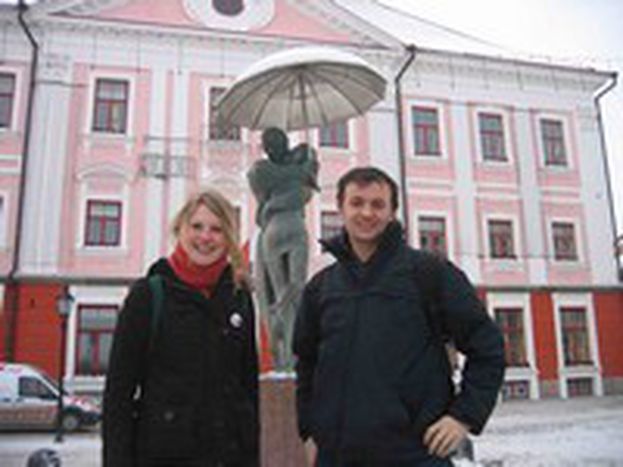
The city of good ideas
Published on
Translation by:
Francesca ReinhardtIn Tartu lies the most prestigious university in Estonia. There are currently many foreign students attending the university, among them four Germans who are very happy with their choice
Anina Trauterman was a little surprised when she first arrived at the University of Tartu. “I thought I would be kind of exotic when I went to study in Estonia,” says the 25 year old student of general linguistics, “but then I met so many Germans with exactly the same idea.”
There are in fact 40 German students who, like this student from Kiel, are attending the University of Tartu. Many colleagues at home find this choice somewhat exotic. Who would choose to study in a small country way up north, with a population of only 1.4 million inhabitants, and a language no one else speaks? However, this blond student had good reason to favour the northern Baltic country. “In my area of study, I needed to learn a non Indo-Germanic language, so I chose Estonian. Apart from that, my sister-in-law is from Estonia and told me a lot about her homeland,” she says.
The ideal study environment
Jakob Quirin, a 22 year old law student from Potsdam, who has already spent two semesters studying at the University of Tartu, is also pleased with his choice. It was not just the fact that since independence, Estonia has strongly oriented itself towards the German legal system that persuaded him. “Somehow, Estonia seems to be more adventurous than other countries,” he observes, and recounts how he has already been warned about bears and wolves when he goes hiking, as they are still common in Estonia’s forests. Even the long winter scared him at first.
Anina has similar fears. “But the stereotype that it’s dark all day at this time of year has to be refuted. The days aren’t any shorter than they are at home in winter and early spring,” she explains, and takes a sip of warm tea. In her eyes, Tartu is a modern European city, without a trace of grimness or Soviet residue. On the contrary, many of the 424 foreign students studying in Tartu this semester find the surroundings ideal. “The teaching and supervision at the university is great,” gushes Anina. “The seminar groups are small, the lecturers are motivated, and a lot of courses are offered in English.” And where else in Europe does a coffee add up to 70 cents and a large beer only €1.50?
European traditions
Most of the foreign students live in a modern student residence, offering internet access and less than a hundred metres from the city centre and the university. This is where Hannah Sigge and her classmate Christian Droste live, two humanities students from Lüneburg studying at the Uiversity of Tartu for a semester. Both have selected a special course for foreign students: Baltic Studies, an introduction to the culture, politics, and European development of the country.
“The thing that surprised me the most was how European it was; there’s absolutely nothing to remind you of the Soviet era,” says Hannah, 22, about the country that has spent hundreds of years under foreign control, enjoyed a spell of independence between 1918-1940 and officially became independent in 1991. In fact, many Tartu residents have always felt Western European, and above all, close to Germany. This applies to the university as well, situated on a little street directly behind city hall.
Founded in 1632 by Swedish King Guztav Adolf II, the university belonged to the Russian Empire for much of its history. Notwithstanding this, till the end of the nineteenth century, the teaching in the imposing white building was done through German. The Russian Czars thought this was a good way to Europeanize their territories.
Student rituals
Today, nearly 18,000 young people attend the university, almost a fifth of the population of Tartu. “The university doesn’t just lie in the centre of town, it is the centre of town,” says Christian Droste. When a proposal was made a few years ago to put a fountain in front of the city hall, the winning design was of a student couple kissing.
A few steps further on, at the other end of the square, an arched bridge leads to the student residence where Christian and other arrivals live. At the beginning of the semester, you can often observe students trying to balance on the six metre high swinging arc of the bridge. One of many student rituals. Jakob Quirin is already an old hand at these games. He has already twice stepped over the one metre wide arc of the bridge. “It looks scary from underneath, but it’s really not that bad.” Hannah and Christian are hoping to soon get up the courage to venture over the concrete structure. “Finally,” says Hannah, “I’ll be a real Tartu student.”
Translated from Eine Stadt voll guter Gedanken



